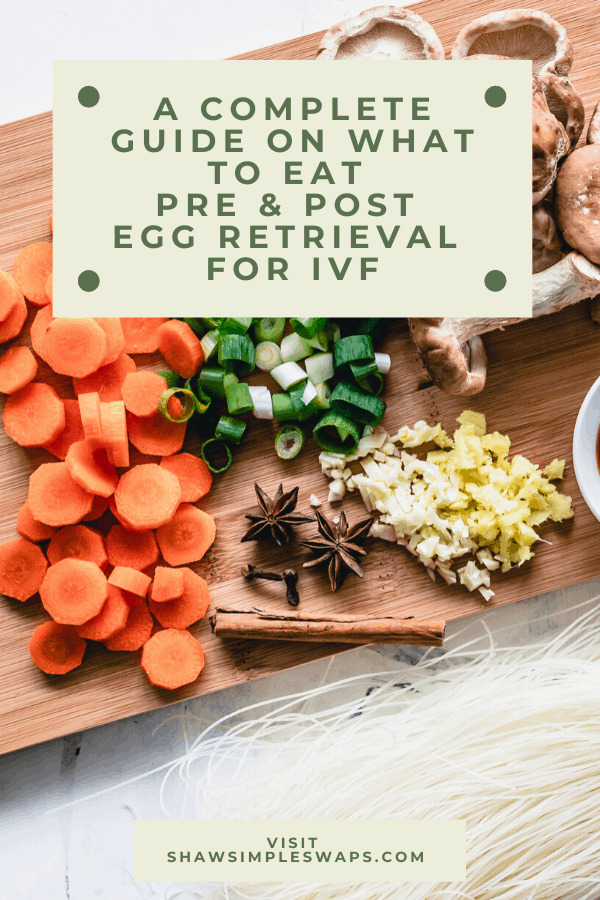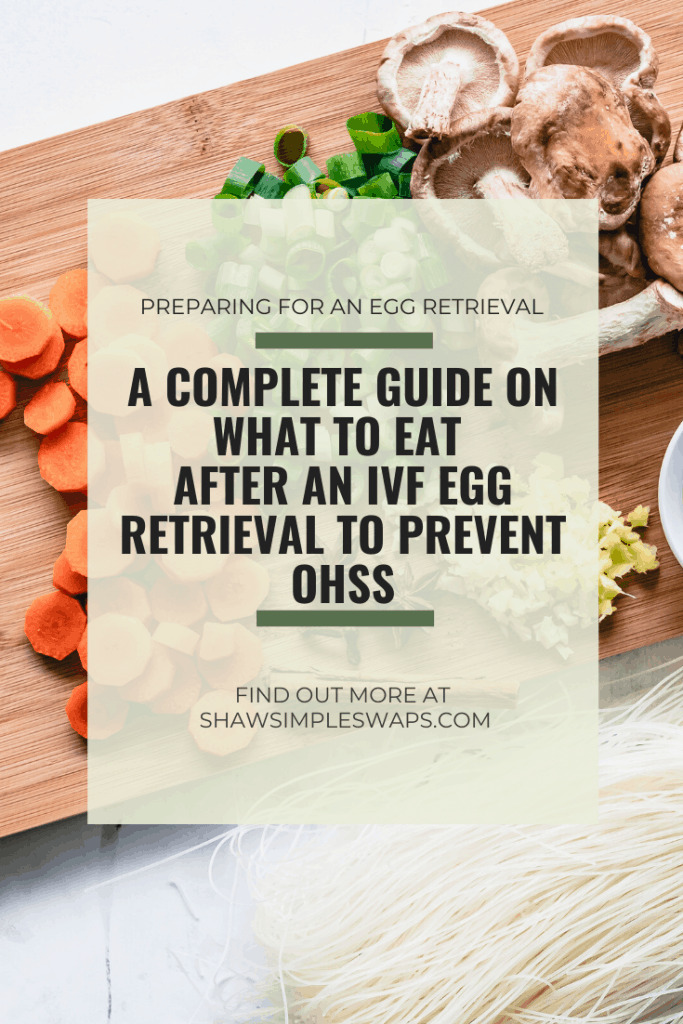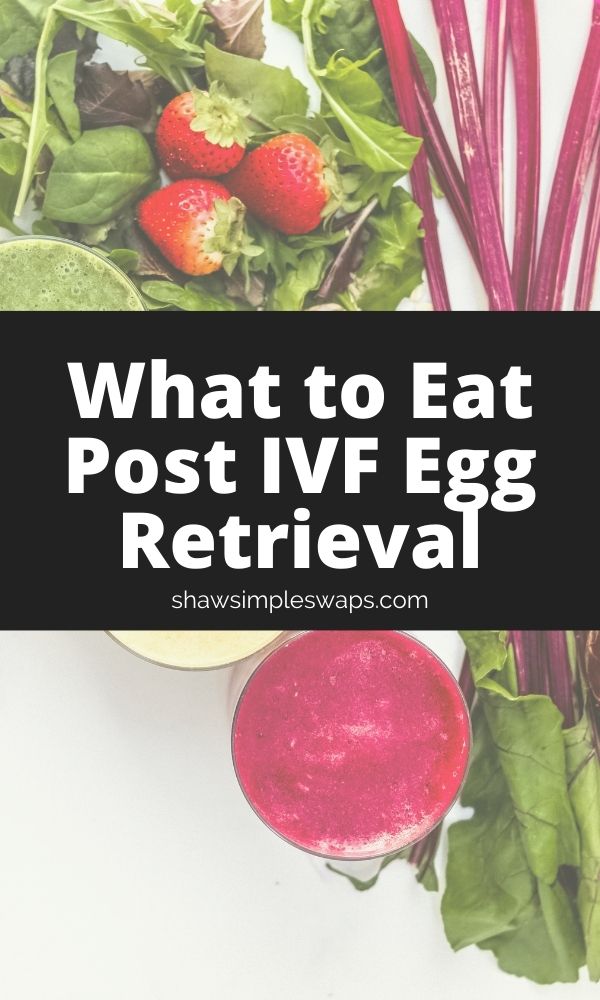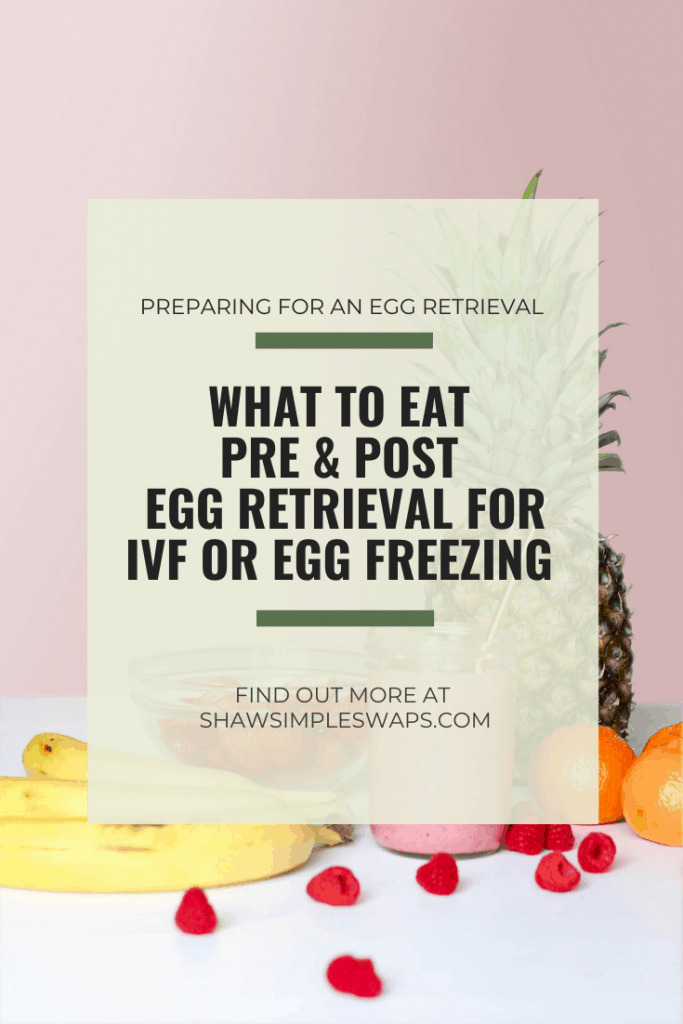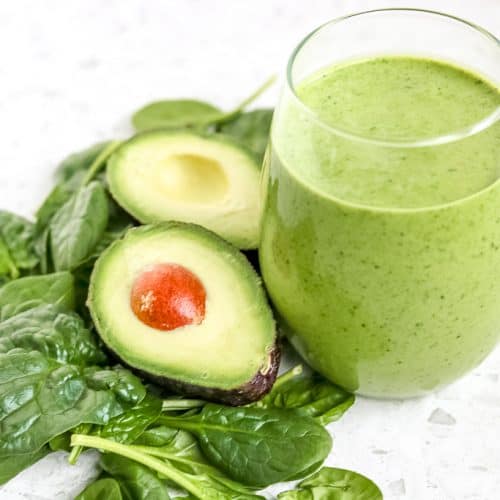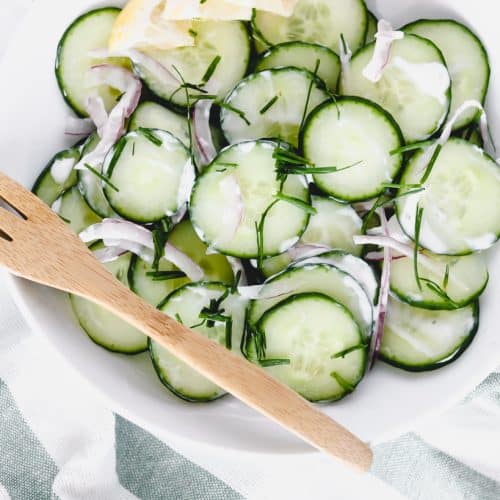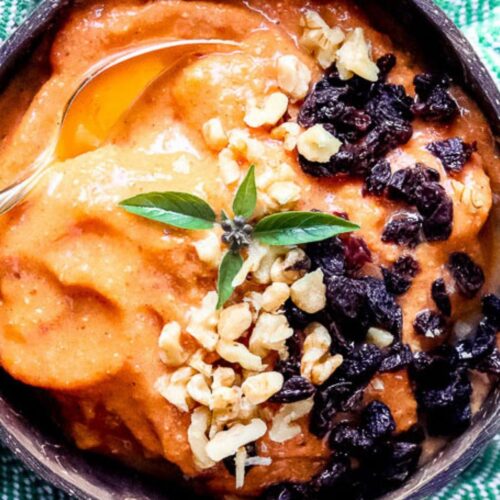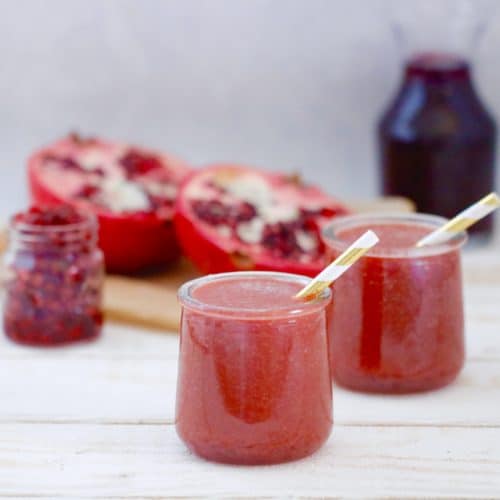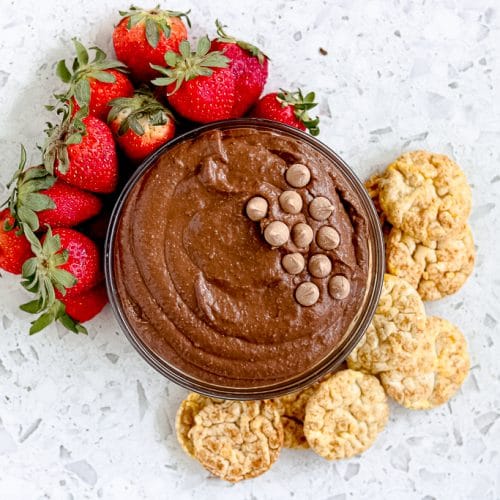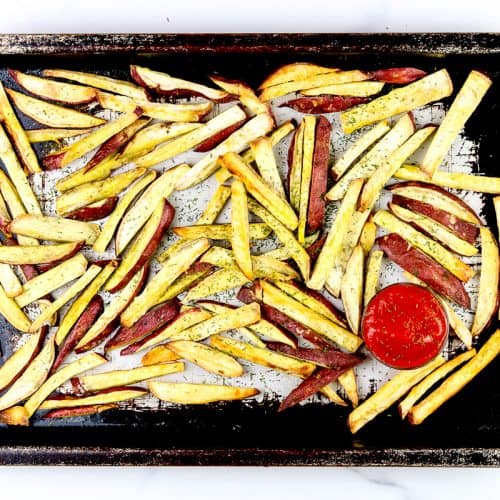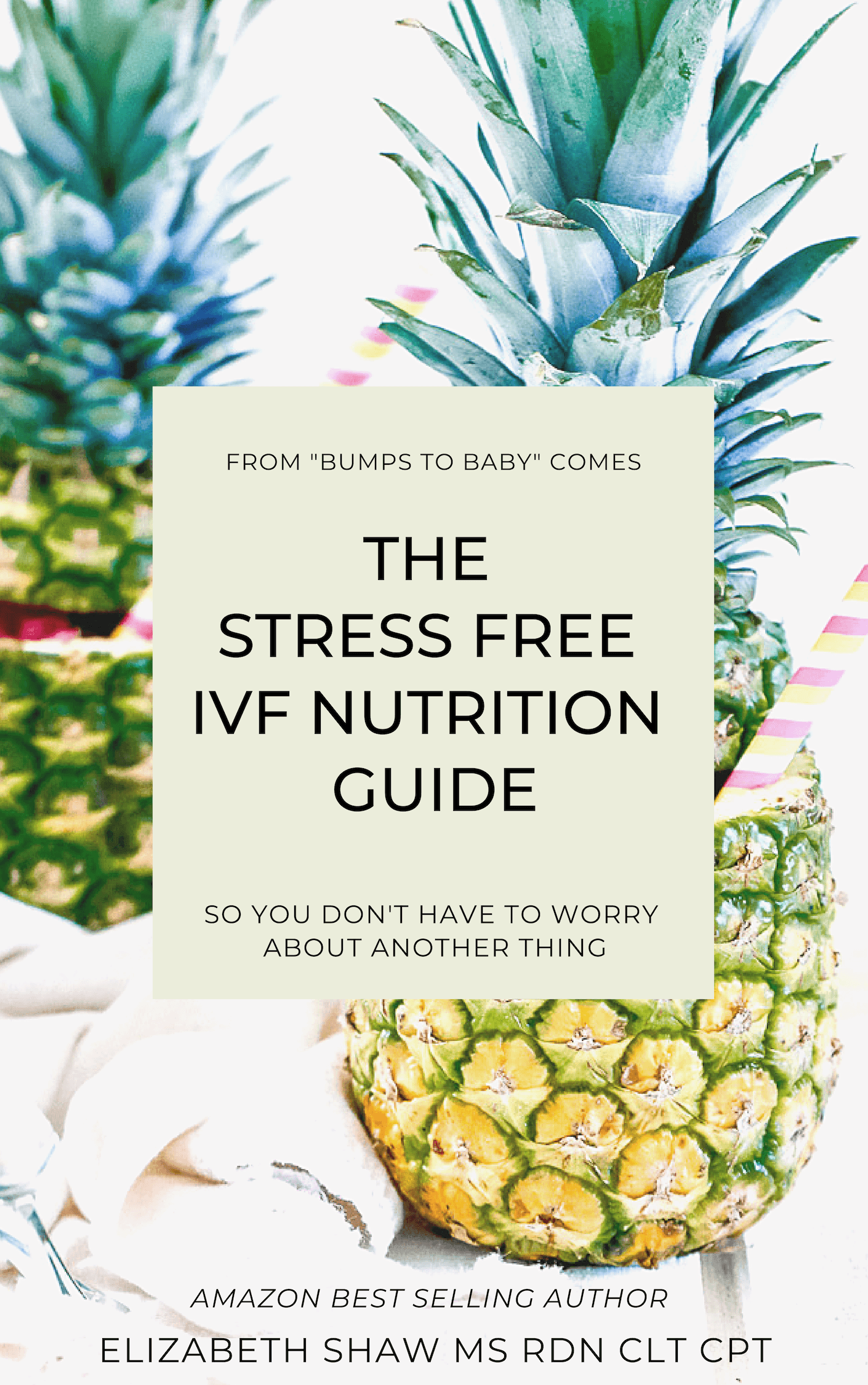If you’re confused about what to eat post egg retrieval during the IVF process, then this is the post for you. With expert advice as a registered dietitian nutritionist and someone who has personally gone through IVF, we will cover the basics and what you need to know to nourish you and baby to be. Rest assured, you aren’t alone! And if you’re wondering what to eat pre-egg retrieval, then checkout this post too.
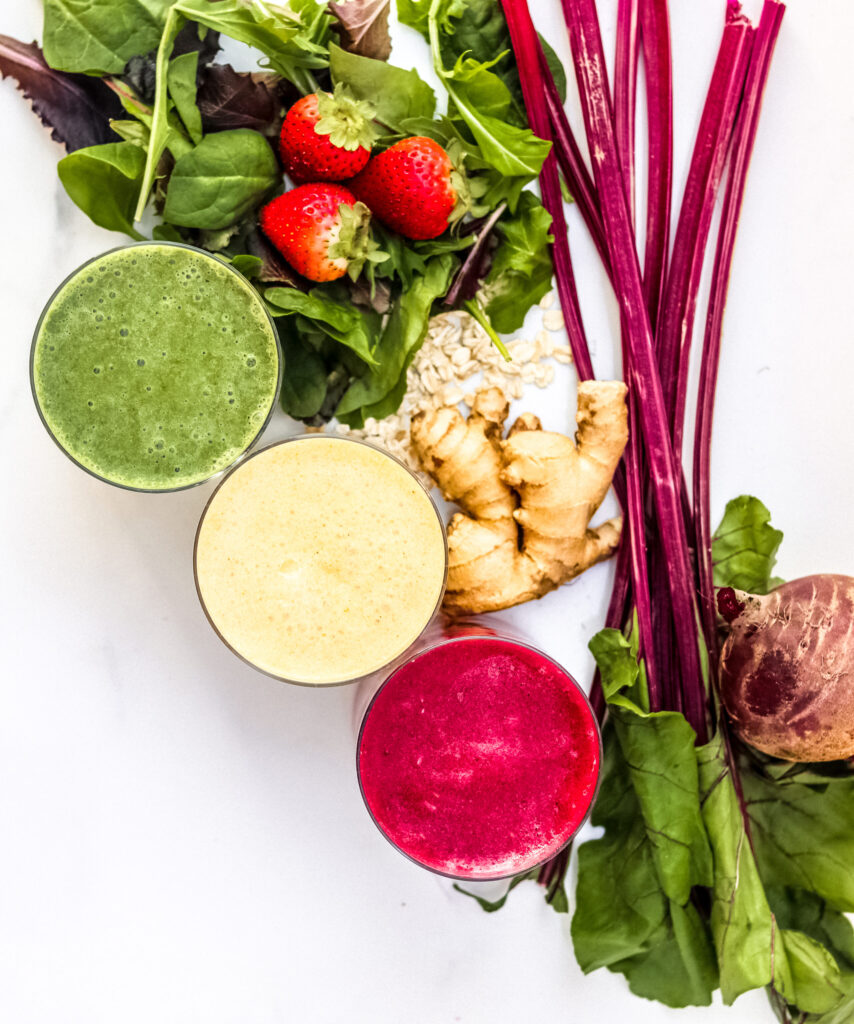
Why Nutrition is Important When Preparing for IVF
As you begin to gear up for the much anticipated egg retrieval day during your in vitro fertilization journey, I’m willing to bet you have an overwhelming urge to do everything within your power to up your changes of success… right?
Well, that’s where nutrition comes into the picture.
Nutrition is so often looked by your reproductive endocrinologist but can play a big role in improving your chances of a successful retrieval.
What we eat has a large impact on how our body responds to stress and inflammation. Given cortisol (the stress hormone) is likely increased during this time, it’s important we continue to include those antioxidant rich foods (like these 9 here) that help lower cortisol and improve our health.
Don’t worry, we’ll chat about this more in depth next.
What Does IVF Nutrition Research Say
How many times have you left your reproductive endocrinologist’s (RE) office in tears, yearning for one thing you can control on this out-of-control journey?
Thankfully, nutrition is one area of your life that you CAN CONTROL when everything else seems so out of control. It is a grounding tool to rely on when you feel lost and alone.
Rather than flood you with terms, I’m going to keep this simple. When it comes to the research, there are 3 main dietary types frequently cited that have shown promise when it comes to increasing one’s odds of experiencing a live birth following an IVF cycle.
3 Main Diet Types Recommended for IVF
- Mediterranean Diet
- High produce consumption, whole grains, plant-based protein, seafood, healthy fats, and positive lifestyle choices (i.e. movement, socialization, non smoking)
- Fertility Diet
- High produce consumption, whole grains, plant-based protein, seafood, healthy fats, dairy
- Pro-Fertility Diet
- High produce consumption, whole grains, plant-based protein, seafood, healthy fats, dairy, supplements, and positive lifestyle choices (i.e. movement, socialization, non smoking)
Past research showed that the guidelines for health and nutrition promoted in the Mediterranean diet resulted in a higher chance of pregnancy for couples who followed this diet during their preconception period (Vujkovic, 2010).
Part of the benefit is thought to be due to the increase in unsaturated fatty acid consumption (hello long-chain unsaturated fatty acids) found in the Mediterranean diet (Vujkovic, 2010). These include the omega-3 and omega-6 fatty acids you’ve heard are so healthy for you. While there is certainly a need for more research on the exact quantities of long-chain unsaturated fatty acids you should be eating for fertility, the consensus amongst the healthcare practitioners is omega-3 fatty acids should be included in a preconception diet (as you’ll see recommended below).
The cool thing is, these findings from the past continue to show promise in the present. A more recent 2018 study demonstrated non-obese women undergoing IVF treatment who showed greater compliance with the Mediterranean diet principles had a higher chance of pregnancy and live birth (Karayiannis, 2018).
Now, the most recent study published in 2019 has found that while the Mediterranean diet is still a wonderful eating plan to encourage healthy habits, the Pro-Fertility Diet may be a better choice for women undergoing infertility treatments (i.e. IVF). This diet may give women a higher probability of implantation, clinical pregnancy and live birth (Gaskins, 2019).
The main difference between the two diets pertains to the Pro-Fertility Diet supplement recommendations and minimizing pesticide-containing produce. While there is certainly a need for more research on the exact amounts of vitamins and minerals to supplement with, I’ve included a handy table below to help guide you in asking your doctor for their best recommendations for you and your health.
I highly encourage you to begin taking the proactive measures you can for your health as soon as you make the decision to try to conceive! Plus, the research does support giving at least two to three months’ time for your body to optimize your new eating behaviors and lifestyle changes to see any beneficial effects it will have on your health and your ability to get pregnant (and the future health of your rainbow) (Stephenson, 2018).
Now that we have some backstory on the research, please don’t get caught up in following one over the other as you can see they are all quite similar. Instead, consider embracing this philosophy:
Eat more plants, healthy fats, whole grains, incorporate some lean proteins like seafood and take a look at your personal supplement intake to help boost your total health as you go through this pivotal time.
What Should You Eat in the Period After IVF Egg Retrieval
To set you up for success post retrieval, here are the top 3 nutrition tips to remember when it comes to your diet. You’ve got enough to stress about right now, I like to make this part as simple as possible!
High Antioxidant Foods
High-antioxidant foods have shown to help rid your body of the bad guys (aka free radicals) that can cause inflammation in your body and affect your fertility. Since your body is going to be under stress already, focus on adding “the rainbow” from fruits and veggies to your diet as each color of produce contains different antioxidants that can lower your inflammatory response!
Here are 3 of my top picks for high-antioxidant foods to add in post retrieval:
Berries (strawberry, blueberries, blackberries, raspberries)
Bell Peppers (orange, yellow, red, green)
Cauliflower and Broccoli (all the colors)
Recipes to Consider
Fuel Up with Fiber
If constipation has ever been an issue on your fertility journey as a result of the medications, then you’re going to want pay special attention to your fiber. While recommendations range between 25 to 37 grams per day, I recommend clients aim to hit the higher end of that range.
Here are 3 of my top picks for high fiber foods to add in post retrieval:
Pears
Recipes to Consider
Focus On Electrolyte Balance – Hydrations + Sodium Foods
There is not a specific sodium amount to consume post retrieval. However, it’s important to speak directly with your healthcare team to ensure they provide you with the best recommendations for your health profile (i.e. if you have a heart condition your advice may be different than someone else to account for both situations.)
Regardless of the above, you still need to be hydrating!
Here are 3 of my top picks for hydration to consider in post retrieval:
Coconut water
Fruit and veggie (i.e. cucumber) infused water
Electrolyte support drinks (if warranted)
Recipes to Consider
A Guide for Egg Retrieval Recovery
If you’d prefer to have a handy guide right in front of you, don’t worry, I’ve got you covered.
The Stress-Free IVF Nutrition Guide is a 60+ page guide that you can have right in front of you. In this guide I go in-depth about what to eat, when, as well as what supplements to take, when, so you no longer have to stress!
Other FAQs Regarding an Egg Retrieval
While every person is indeed different with how their body will respond to the IVF egg retrieval process, most doctors will warn patients that day 3 and 4 post-op are usually the worst.
From my experience, this was spot on. I literally couldn’t move. I sat in a chair, feet up with ice packs and heating pads rotating on my abdomen.
But, I’ve had clients who felt totally fine, just some minor cramping on these days. So, rest assured, everyone is totally individualized! Hopefully you will escape the pain too!
First off, OHSS is a condition caused by hormone medications that cause the ovaries to swell and fill with fluid. OHSS can be life threatening if not addressed immediately.
In order to help draw the fluid out of the ovaries and prevent accumulation in your abdomen, electrolyte balance is key. Focusing on including more sodium rich foods is often recommended post retrieval.
A way to minimize the effects of OHSS involves consuming sodium rich foods for a few days post retrieval to help draw the extra fluid out of your ovaries. While there are no specific recommendations for the amount of sodium to consume, a general rule of thumb I tell my clients is to focus on adding a little extra salt to their meals, or having a few high sodium snacks like salted mixed nuts, whole grain pretzels or a little nitrite-free turkey jerky.
If you haven’t experienced this yet on the IVF journey, you may post egg retrieval due to the anesthesia you are put under and due to hormonal shifts.
The best ways to help keep your system running as smooth as possible include:
– Drinking more fluids. (Try a little prune juice, too.)
– Adding in some flax and chia seed to a smoothie.
– Focusing on fiber rich meals (like these Healthy Stuffed Sweet Potatoes.)
– Try a magnesium supplement. The recommended dietary allowance (RDA) for females
of childbearing age is 310 mg, so ask your doctor and then give it a go. And I hope you
do go, too!!!
This is a great question! And truthfully it is VERY individualized; re, you need to consult with your doctor. A general rule of thumb is to reframe from intense impact and abdominal workouts. I recommend clients consider walking, hiking, and yoga as a means of movement (and stress relief) during the first week or two post retrieval.
I know how hard this journey is. Please reach out if I can help further. Wishing you much success as you recover post egg retrieval.
***Please note this information is not intended as medical advice.
Thanks so much for stopping by! If you enjoyed this post, please consider sharing it with a friend and tagging me on social: Facebook, Instagram, or Pinterest.
References:
Vujkovic, M., de Vries, J., Lindemans, J., Macklon, N., van der Spek, P., Steegers, E., & Steegers-Theunissen, R. (2010). The preconception Mediterranean dietary pattern in couples undergoing in vitro fertilization/intracytoplasmic sperm injection treatment increases the chance of pregnancy. Fertility And Sterility, 94(6), 2096-2101. doi: 10.1016/j.fertnstert.2009.12.079
Karayiannis, D., Kontogianni, M., Mendorou, C., Mastrominas, M., & Yiannakouris, N. (2018). Adherence to the Mediterranean diet and IVF success rate among non-obese women attempting fertility. Human Reproduction, 33(3), 494-502. doi: 10.1093/humrep/dey003
Gaskins AJ, Nassan FL, Chiu Y-H, Arvizu M, Williams PL, Keller MG, Souter I, Hauser R, Chavarro JE, for the EARTH Study Team, Dietary Patterns and Outcomes of Assisted Reproduction, American Journal of Obstetrics and Gynecology (2019).
Stephenson, J., Heslehurst, N., Hall, J., Schoenaker, D., Hutchinson, J., & Cade, J. et al. (2018). Before the beginning: nutrition and lifestyle in the preconception period and its importance for future health. The Lancet, 391(10132), 1830-1841. doi: 10.1016/s0140- 6736(18)30311-8


